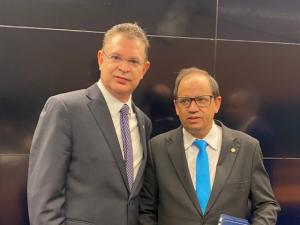I just returned from a trip to Brazil, which involved research in three major cities: Manaus, São Paulo, and Brasília. My colleagues (Princeton’s Raimundo Barreto and Auburn’s Erica Ramírez) and I are interested, among other things, in underexplored aspects of Christian Nationalism and its transnational nature. Scholars of Christian Nationalism in the U.S. have rightly observed that the phenomenon cannot be dismissed as a fringe project. Research suggests that a significant part of the U.S. population embraces or sympathizes with Christian Nationalism.[1] In light of the growing visibility of Christian Nationalism in the U.S., forcefully exemplified by the rise of Donald Trump to the presidency and the January 6 insurrection, several studies on the phenomenon have been published in the last few years.[2]

However, scholars paid little attention to the global nature, interdependent development, and complex theological underpinnings of Christian Nationalism, communicating this phenomenon primarily via narratives bounded by U.S. borders.[3] Our findings—which we will articulate in future publications—challenge the assumption (or narrative) that what became commonly known as Christian Nationalism can be sufficiently explained without considering its border-crossing circumambulations; it is such a complex phenomenon that it demands a global, multilingual, and multidisciplinary approach.

When seen through a transnational lens, the theological sophistication, multidirectional strategies and connections, and transnational political influences of historical and contemporary manifestations of Christian Nationalism are more clearly revealed. Brazilian-based theopolitical networks are critical to Christian Nationalism writ large. More specifically, these conservative religious networks develop and implement multilevel ideologies and practices, simultaneously strengthening complex national, transnational, and multinational coalitions that include United States spaces but also transcend them. These coalitions involve local faith communities as an essential base—a feature largely neglected in several studies. They also recruit businesspeople, elected officials, military personnel, and artists to implement a multilayered strategy founded mainly on their conviction that they were commissioned to establish a worldwide “Government of the Just.” In other words, these Christian Nationalist networks coalesce around the aspiration to exercise broad dominion over what they consider to be their spiritual, geographical, and political territories.
My colleagues and I are continuing this research and hope to publish about it in the near future.
[1] See Andrew L. Whitehead and Samuel L. Perry, Taking America Back for God: Christian Nationalism in the United States (New York: Oxford University Press, 2020), 25.
[2] For a few examples, see Pamela Cooper-White, The Psychology of Christian Nationalism: Why People Are Drawn in and How to Talk Across the Divide (Minneapolis: Augsburg Fortress Publishers, 2022); Philip S. Gorski, Samuel L. Perry, and Jemar Tisby, The Flag and the Cross: White Christian Nationalism and the Threat to American Democracy (New York: Oxford University Press, 2022); Paul David Miller and David French, The Religion of American Greatness: What’s Wrong with Christian Nationalism (Downers Grove: IVP Academic, 2022); Bradley B. Onishi, Preparing for War: The Extremist History of White Christian Nationalism–and what Comes Next (Minneapolis: Broadleaf Books, 2023); and Lerone A. Martin, The Gospel of J. Edgar Hoover: How the FBI Aided and Abetted the Rise of White Christian Nationalism (Princeton: Princeton University Press, 2023). None of these volumes pay attention to the transnational nature of Christian Nationalism.
[3] For examples of studies and opinion pieces that consider the transnational elements of Christian Nationalism (or similar characteristics that may appear under the terminology of the “Religious Right”), see Raimundo Barreto and Joao B. Chaves, “The Shared Religious Roots of Twin Insurrections in the U.S. and Brazil.” The Washington Post, January 18, 2023; Benjamin A. Cowan, Moral Majorities across the Americas: Brazil, the United States, and the Creation of the Religious Right (Chapel Hill: The University of North Carolina Press, 2021); and Raimundo Barreto and Joao B. Chaves, “Bolsonaro’s Faith-Based Enablers.” The Christian Century (1902) 138 (24), 2021: 22-25.













